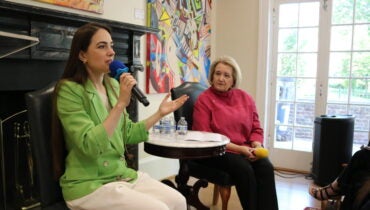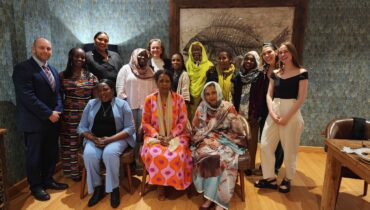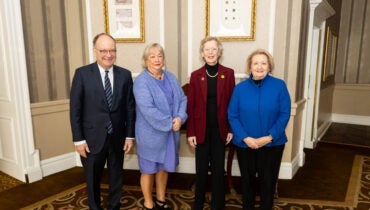Sister Rosemary Nyirumbe works to rehabilitate girls who have previously been held by the Lord’s Resistance Army in Uganda. Mayesha Alam, Associate Director of the Georgetown Institute for Women, Peace & Security, sat down with her to discuss the violence committed against the girls and how she works to restore their lives and livelihoods through education and skill-building.
Mayesha Alam: To begin with, can you talk a little about these girls who come to you who have suffered unimaginable violence and harm – what is it that they need when they reach your refuge, what do they ask for and what do you give them immediately?
Rosemary Nyirumbe: When these girls return, sometimes you find they are having no hope completely. They don’t even think people can accept them, they don’t even think people can sit with them; they fear they are going to be judged. So what I see immediately is their basic needs. And sometimes they even feel, “If I ask, people will not give me what I want.” And you find they need everything. But most of all, [they need] love, care and acceptance. They need people who can open their arms and say, “I accept you as you are, and I’m not remembering your past. The past is already gone. We are starting from here.” That is what I always start with to make sure we walk side-by-side…I remain with them to give them that courage and hope.
“Most of these young people who come, [as] much as the rebels abducted them, treated them badly, and gave them children out of rape and sex slavery – they manage to escape and come back.”
MA: You’ve talked about how providing skills is one of the central pillars of your work. What does a needle or a sewing machine mean to these girls, their communities and their countries?
RN: What I have realized is that most of these young people who come, [as] much as the rebels abducted them, treated them badly, and gave them children out of rape and sex slavery – they manage to escape and come back. And when they come back, their only chance at any education is totally gone. And it’s so difficult to know exactly where to start from in terms of training or helping them.
“The rebels use machine guns or other guns to destroy the lives of these girls; we decided to show that the [sewing] machine is a way of restoring the lives of these girls, because we are sewing back the lives of the broken girls with a needle and machine.”
I found [that] a needle and sewing machine was a very, very powerful tool. If I want to talk about dressmaking, I go straight to the practical aspects of it. If you look at a human being, you can decide how this dress is going to look…I’m not a seamstress, but I decided to look at myself in a mirror and make my dress. This is exactly what I taught these girls. And the other skills, like hairdressing, are part of the beauty of a woman. I said, “If you learn how to make hair beautiful, that’s going to be something that women will come to you for.” And cooking. I never went to culinary school, but I learned basic cookery. I taught these girls how to cook, and all of them to be able to really know [that] this is one of the ways of getting money in their hands if they cook well.
And of course, I was all the time with them and showing them the way, until I started a catering school. And the catering school needs people who go very far with their education, and I started teaching practical catering, basic cookery, and cooking African foods in a very good way. And now most of these girls are employed in hotels, and some of these girls start their own businesses. These girls need the sewing machine as a tool for fighting back the war. It’s very, very symbolic to say that the rebels use machine guns or other guns to destroy the lives of these girls, we decided to show that the [sewing] machine is a way of restoring the lives of these girls, because we are sewing back the lives of the broken girls with a needle and machine.
MA: One of the saddest and most shocking truths of violent conflict today is that girls are weapons of war. And girls who bear children of rapists and soldiers bring into the world weapons of war as well. What do you do to change the reality of the children who are brought into the world out of war, rape and destruction?
RN: One thing we all have to remember is that when these women come back, they are scared, they are frightened and they are deeply traumatized. And the trauma of the girls is actually double. First of all, to live with your captor, who claims he’s your “husband” – husband in quotes because he is going to rape this girl very many times and he is going to punish this girl when she doesn’t accept sex. So that is forced sex. These girls [are impregnated by] these captors, and then when these girls come back, they escape with these very children. And again, if you imagine that we look at these children and say, “these girls have these children and they are being trained as soldiers – they are fighters.” To leave them out, I totally believe that we will only be growing a generation [that] will perpetuate the evil forever.
“I would like people to focus attention on these women, on these children, who were the victims. Let us make them not feel that they are victims. Let us focus our attention.”
And I use the tool of education. With a practical education, or any type of education, you let these girls and their children understand this is what will set them free. And what I also realized, the fear these girls go through, the trauma they go through, is something that will live with them forever. And they transfer it to their children, so much so that these girls are never safe to leave their children behind. They have decided to leave with their children because they wouldn’t want anyone to take revenge on their children or kill their children. I answer that by inviting these girls to come to this school with their children. In fact, this has been the only school we started where you have a mother and baby. I started looking at it in a more positive way, saying that if we want a mother to succeed, we need her to study with her children or her child so she knows her child is safe.
That has been the most successful model to say that a mother and child can be together in education. And of course for us, we are aiming at a better life for these young ones, so much so that I started a daycare and kindergarten. I’m never a specialist in all of these things; it’s just that I reflect and think, “If we aim at education for the children, we need to start right from kindergarten, and we need to start by care.” To this point, I can imagine that the children who were cared for and who came through this kindergarten are not going to think about violence. We really have to take them slowly with their mothers to explain that this is your father. But they are totally free. And they’re looking towards the future with hope. They’re ready to go on with their education.
MA: If you could ask for anything from the Ugandan government, the African Union or the international community, what would ask them for that you are not receiving?
RN: Recently, I was on Huffington Post and they were asking me about the rebels and the rebel leaders. They are searching for him, and so I said, “That’s fine, but know that the rebels and their leader did not start existing only two years ago or three years ago. They existed for the last thirty years.” So, in this case, I would like people to focus attention on these women, on these children, who were the victims. Let us make them not feel that they are victims. Let us focus our attention. All the money you’d like to use to go and capture the rebels – I don’t mind, you can continue doing that. But give me part of that money to rehabilitate the lives of these children, to give them education, to mend their broken lives. Give me some of those finances to buy needles and sewing machines. And think, are we not going to rehabilitate their lives and are we not going to put a future generation to a better place?
“All the money you’d like to use to go and capture the rebels – I don’t mind, you can continue doing that. But give me part of that money to rehabilitate the lives of these children, to give them education, to mend their broken lives. Give me some of those finances to buy needles and sewing machines.”
This interview was made possible through a partnership between the Georgetown Institute for Women, Peace and Security and Women in the World. You can find a PDF of this interview here.


